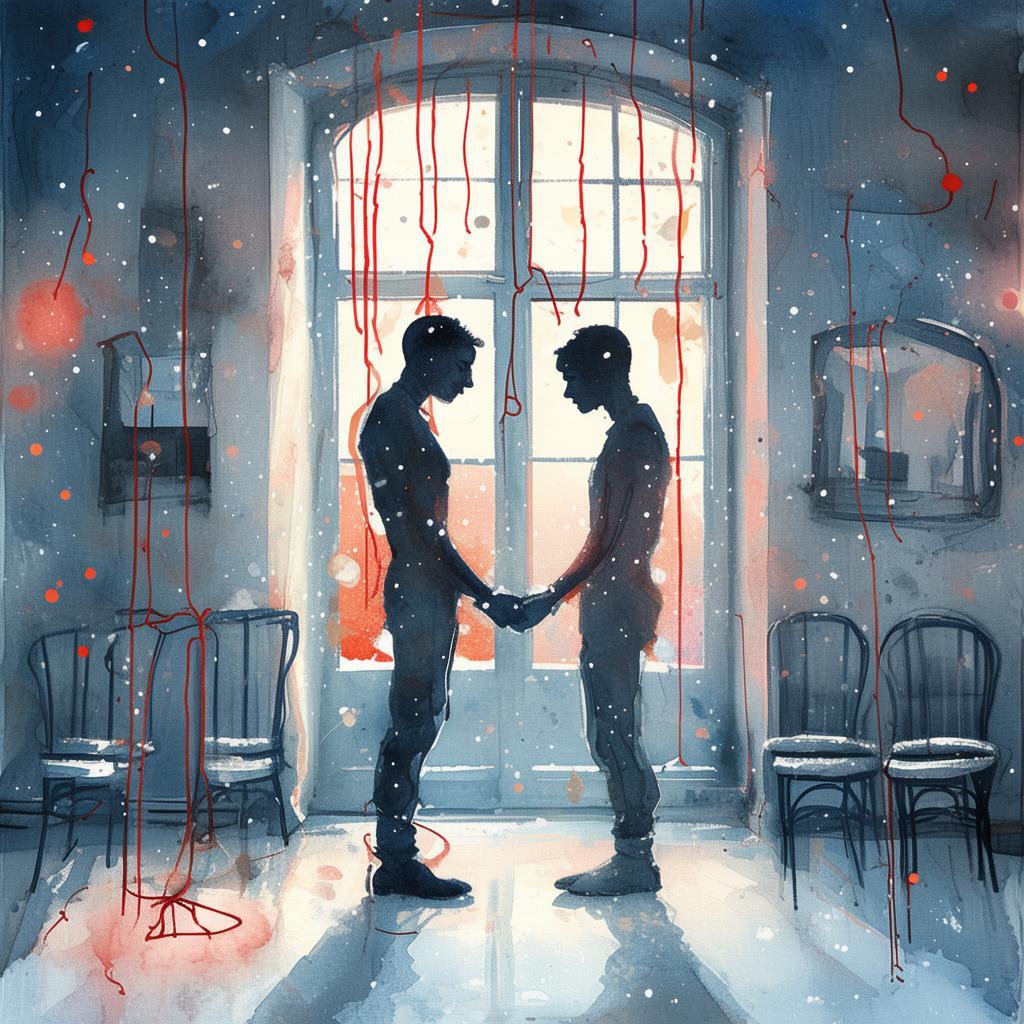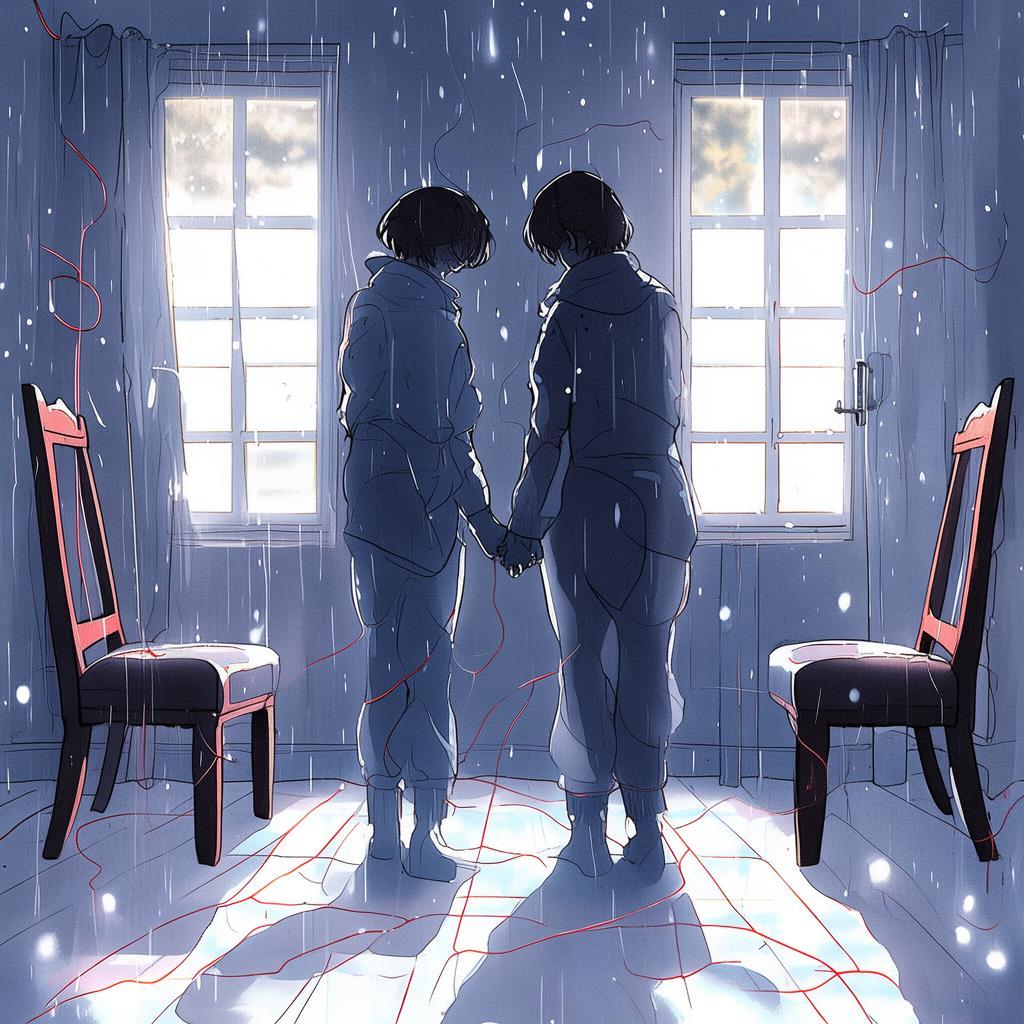Whispers of the Past: A Father's Zenith
In the heart of a bustling city, where the echoes of the past linger in the cobblestone streets, lived a man named Jin. Jin was a man of few words, his life a tapestry woven from the threads of duty and silence. He worked as a curator in a small, overlooked museum, where the walls whispered tales of the city's history. Jin's days were filled with the silent companionship of his father's portrait, a portrait that hung prominently in his office, a silent sentinel over his work.
The portrait was of a man with a gaze that seemed to pierce through time, a man whose eyes held the weight of secrets untold. Jin had always been fascinated by the portrait, but it was not until a chance discovery in the museum's archives that he learned the truth behind the man's eyes.
One rainy afternoon, while sorting through old documents, Jin stumbled upon a letter addressed to his late father, a letter that spoke of a forbidden love, a love that spanned generations. The letter spoke of a man named Wei, a man who had been a part of Jin's life without him ever knowing it. Wei had been his father's mentor, a man who had shaped his father's life in ways Jin could never have imagined.
Intrigued and confused, Jin began to piece together the puzzle. He learned that Wei had been a renowned artist, a man whose work had been shrouded in mystery and intrigue. Jin's father had never spoken of Wei, and Jin had always assumed that the man had simply faded into the background of his life.
As Jin delved deeper, he discovered that Wei had not only been an artist but also a spy, a man who had risked everything for the love of another. The portrait, it turned out, was a cover for a man who had lived a life of secrets and danger.
The revelation sent Jin on a journey that took him from the quiet halls of the museum to the bustling streets of the city. He sought out clues, piecing together the fragments of a life that had been carefully hidden from him. Along the way, Jin encountered old friends and new allies, each one a piece of the puzzle that was his father's past.
One evening, as Jin stood before the portrait, a figure approached him. It was a man who looked strikingly similar to the portrait, a man with eyes that held the same depth and mystery. The man introduced himself as Wei's son, a descendant of the man whose portrait had hung in Jin's office for so many years.
The two men sat down, and Jin poured out his heart, sharing the letter and his discovery. Wei's son listened intently, his eyes reflecting the same pain and longing that Jin felt. It was then that Jin learned that Wei had loved his father deeply, a love that had been forbidden and suppressed by the times.
The revelation brought Jin face to face with his own identity. He realized that he had been searching for something all his life, a connection to the past, a piece of himself that had been lost. In Wei's son, Jin found a kindred spirit, a brother in the truest sense of the word.

As the story unfolded, Jin and Wei's son embarked on a quest to uncover the truth about their ancestors, a quest that led them to the very heart of the city's history. They discovered that the love between Wei and Jin's father had been a love that had transcended time, a love that had shaped the very fabric of their lives.
The climax of their journey came when they uncovered a hidden room in the museum, a room that had been sealed for decades. Inside, they found a collection of paintings, each one a testament to the love and passion that had driven Wei and Jin's father. The paintings were a revelation, a window into the souls of two men who had loved deeply and freely.
In the end, Jin realized that the portrait was more than just a reminder of his father's past; it was a symbol of the love that had bound their lives together. He understood that the search for his identity had not been about finding himself, but about rediscovering the love that had always been there, waiting to be acknowledged.
The story of Jin and Wei's son became a legend in the city, a tale of love, loss, and redemption. The portrait of the man with the piercing gaze remained in Jin's office, a reminder of the past and a testament to the enduring power of love.
As Jin looked at the portrait one last time, he felt a sense of peace wash over him. He had found the connection he had been seeking, a connection to his father, to Wei, and to the love that had shaped their lives. In the end, the portrait was not just a portrait of a man; it was a portrait of a family, a family bound by love and secrets, a family that had finally found its voice.
✨ Original Statement ✨
All articles published on this website (including but not limited to text, images, videos, and other content) are original or authorized for reposting and are protected by relevant laws. Without the explicit written permission of this website, no individual or organization may copy, modify, repost, or use the content for commercial purposes.
If you need to quote or cooperate, please contact this site for authorization. We reserve the right to pursue legal responsibility for any unauthorized use.
Hereby declared.









